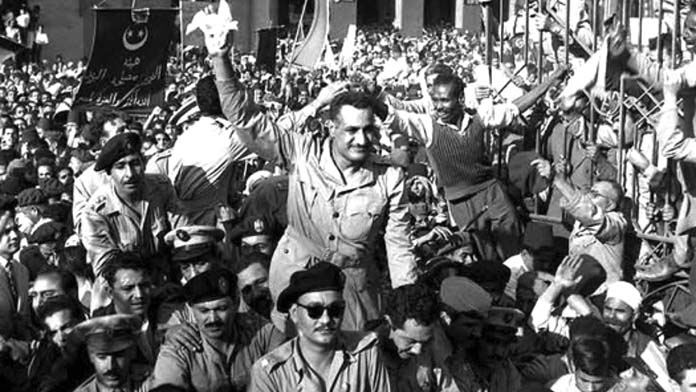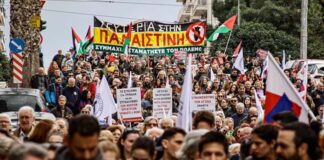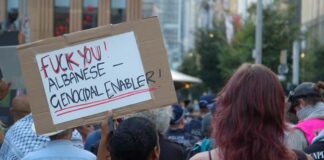The national independence movements of the 1950s fought Western imperialism, but the states that resulted were not capable of winning real liberation, writes Miro Sandev
Israel’s establishment as a settler state in Palestine relied on European colonialism and the support of Western imperialist powers. The biggest challenge to this was the wave of national liberation struggles in the 1940s and 1950s that successfully ousted European colonial masters from Egypt, Iraq and Syria.
Colonial rule over the Middle East, and the humiliation of the Palestinians through the seizure of their land to create Israel in 1948, produced a powerful movement for a pan-Arab struggle against imperialist control.
People held out hope that with national independence, poverty and underdevelopment would also end.
However, these movements’ refusal to challenge the capitalist system meant their leaders were forced into collaborating with imperialist powers—including Israel—as well as attacking their own people to maintain power.
At the end of the Second World War, Egypt, Iraq and Jordan were ruled by pro-British monarchs. Hundreds of thousands of British troops were stationed across the region. The Suez Canal, vital for British control of India, was firmly in British hands. The Anglo-Egyptian Treaty of 1936 meant Egyptian governments were effectively controlled by Britain.
By 1952 a growing movement for national liberation in Egypt had weakened the state and fomented dissent within the army. A guerrilla campaign was harassing British forces. Gamal Abdel Nasser led a coup by the Free Officers group against the monarchy. They took advantage of the crisis but they were not central to the movement which helped to create it.
When the Free Officers took power they quickly asserted their domination, cracking down on left-wing unions and students and eventually banning all other political parties.
Nasser argued that the capitalist state could be used as a tool to change society. He imposed a one-party state under the guise of a three-year “transitional period” of military rule. He crushed a strike by textile workers just weeks after the coup, hanging two of the strikers.
Nasser’s regime nevertheless was popular for kicking out the British and its efforts to address poverty and underdevelopment through the nationalisation of banks, insurance companies, shipping, transport and the press. The property of Egypt’s 600 wealthiest families was seized. Land reforms were also introduced, eliminating the biggest landlords by limiting the amount of land any one family could own.
He called these reforms “Arab socialism” but most of the capitalist structure remained intact. Nasser copied the state capitalist strategy of Stalinist Russia by using state control of the economy to impose a program of planned industrialisation.
Nasser became a hero of the anti-imperialist and Arab nationalist movement in 1956 after he nationalised the Suez Canal at the expense of its French and British owners. A joint invasion by Britain, France and Israel to try to retake it was aborted as a result of US pressure. This gave Nasser a symbolic victory over Western imperialism.
Iraqi revolution
The 1958 nationalist revolution in Iraq held out similar hopes of liberation. The regime that ruled the country until the revolution was imposed by Britain following its seizure of Iraq during the First World War.
In the ten years leading up to the 1958 revolution, Iraq’s monarchy was shaken by growing waves of workers’ strikes and protests. In 1948 strikes by rail, postal and oil workers rocked the country. Three thousand oil industry workers occupied the K3 pumping station, elected a strike committee, organised around-the-clock picketing, support from local villages and, later, a 250-kilometre march to Baghdad.
“Al-Intifada” (the uprising) erupted in 1952. Mass demonstrations came onto the streets to demand an end to the corrupt electoral system. The regime again responded with brutal repression.
By 1958 the British-backed monarchy was totally isolated. On the day that the army officers led by Abd al-Karim Qasim removed the puppet king the capital overflowed with people, chanting: “Death to the traitors and agents of imperialism!”
Significant reforms followed. Unions were legalised, the eight-hour day established, rents cut by 20 per cent, social insurance introduced, wages increased by as much as 50 per cent, prices on bread and flour cut. Substantial land redistribution broke the power of the tiny landowning elite.
Failure of national liberation
Iraqis were united in their opposition to the British but a struggle soon emerged over the shape of the new Iraqi society.
Workers in Baghdad, determined to prevent a counter-revolution by the old regime, began organising armed resistance cells, urged on by the main party among workers, the Iraqi Communist Party (ICP).
Although workers were mobilising against the old regime, their actions challenged Qasim’s agenda.
As the party with the deepest roots among the masses, the ICP faced a choice. It could keep Qasim in power or lead workers to take power themselves.
Qasim, like Nasser, based his movement on the middle classes in the state bureaucracy and the military. He was concerned to reassure the upper classes, the foreign investors and the military elites that he could be trusted to look after their interests.
A clash between Qasim and the ICP seemed inevitable. Britain backed Qasim, providing him with arms to help crush any attempt at a workers’ revolution. But the revolution never came.
The ICP’s Stalinist politics meant it saw its role as limited to consolidating the nationalist revolution by working with the military, rather than fighting for a socialist revolution. The ICP retreated and declared its loyalty to Qasim, who responded by repressing the party.
As the mass movement subsided, more conservative political currents came to the fore, including the Ba’ath Party. Its leader Saddam Hussein had no problem collaborating with US imperialism when it suited him.
Popular anti-imperialism
Nasser postured as a supporter of the Palestinian struggle, backing the Palestine Liberation Organisation when it was launched in 1964.
But Nasser did not want a clash with Israel. When Israel began threatening war with Syria in 1967, however, Nasser mobilised troops in the hope of deterring Israel’s attack. His prestige as the leader of the Arab nationalist movement seemed at stake. The result was disastrous.
Israel defeated the combined armies of Egypt, Jordan and Syria in six days. The entire Egyptian air force was disabled in the first hour of the war.
British socialist Tony Cliff argued at the time, “The strength of the anti-imperialist liberation movement is in the masses of the workers and peasants mobilised.”
There had been a glimpse of that potential when Britain, France and Israel invaded Egypt in 1956. British writer Anne Alexander records “the popular mobilisation led by Communist activists who had played a central role in the mass movement against the British occupation during the 1940s”. They organised civil defence, smuggled arms to the guerrilla resistance and mobilised thousands of volunteers for military training.
Similarly, despite its slide into being part of the Lebanese ruling class, Hezbollah was able to defeat Israel in the 2006 war. It succeeded in mobilising thousands of ordinary people into a popular force that combined guerrilla resistance with a more centralised command structure to defend Lebanese communities in the south.
However, Nasser’s military strategy was the exact opposite. His was an anti-imperialism from above, which relied on the professional army officers and the military establishment.
Following Egypt’s defeat in the 1967 war, Nasser began to call for peace with Israel. While he provided arms and finance to the Palestinian militant group Fatah, the main group in the PLO, he also advised its leader Yasser Arafat to seek peace with Israel and to aim no higher than a meagre Palestinian state in the West Bank and Gaza.
Following the defeat, Egypt eventually made its peace with Western imperialism, just as Iraq had. Anwar al-Sadat, who took over when Nasser died in 1970, signed a historic peace treaty with Israel and in return Egypt began receiving massive amounts of US aid, much of it military aid to help prop up the dictatorship.
Fight for socialism
Socialists defend the right of colonised peoples to resist their oppressors by any means necessary. We unconditionally support national liberation struggles like those of the Egyptians and Iraqis against Britain and of Palestinian resistance groups like Hamas against Israel.
These struggles serve to weaken the hold of imperialism and can create opportunities to fight for socialism. However, this support does not preclude criticism of how the struggle is waged.
The Arab nationalists’ aim of establishing independent states within global capitalism failed to deliver real liberation. It simply put new ruling classes in power that established brutal dictatorships in countries like Egypt and Syria that have spent decades attacking the living standards of workers and the poor.
The Arab revolutions in 2011 were directed squarely at the regimes that resulted from the distorted outcome of national liberation. The mass uprisings and strikes in Egypt and Tunisia that toppled dictatorships show that real change is still possible.
The struggle for Palestine cannot succeed without support from across the region. It remains bound up with the struggle for workers’ liberation.
Egyptian port workers could stop all shipping passing through the Suez Canal. Iraqi oil workers could turn off the tap to the oil supplies.
To do this, those workers will have to fight their billionaire bosses and the corrupt rulers who collaborate with Israel.
Hamas and other Palestinian factions should be agitating for this sort of solidarity action. In return they need to stand shoulder to shoulder with Arab workers when they rise up against their own rulers. But that would mean a break from their current policy of “non-interference” in the politics of other countries.
The army that can free Palestine is not the one controlled by Egyptian dictator al-Sisi or the Jordanian King. It is the tens of millions of workers across the Middle East who could be mobilised in a popular struggle against both the Israeli apartheid regime and their own capitalist rulers.






